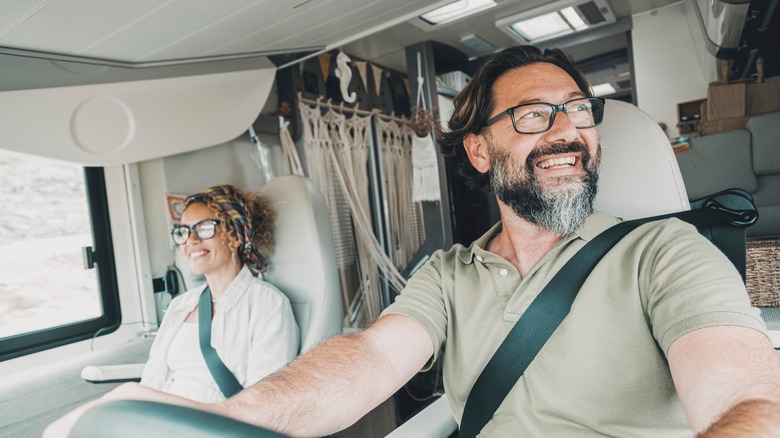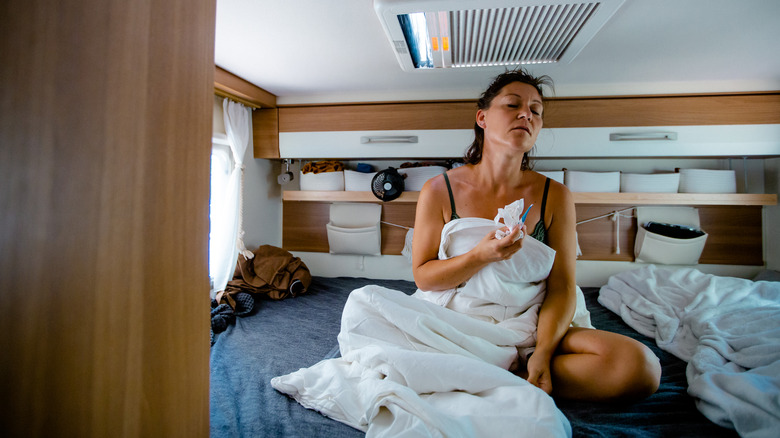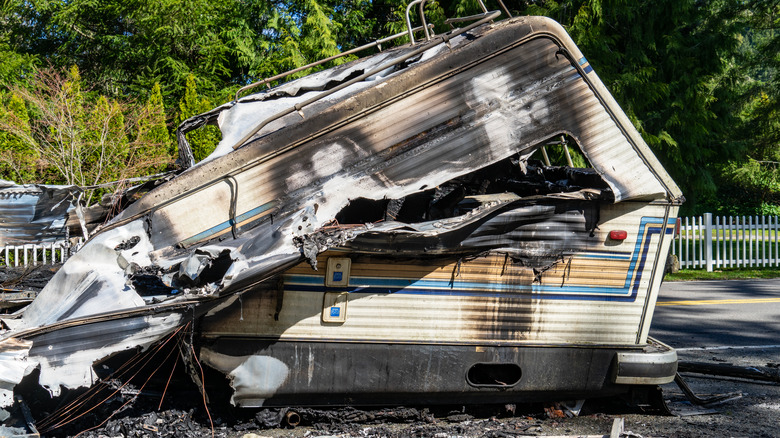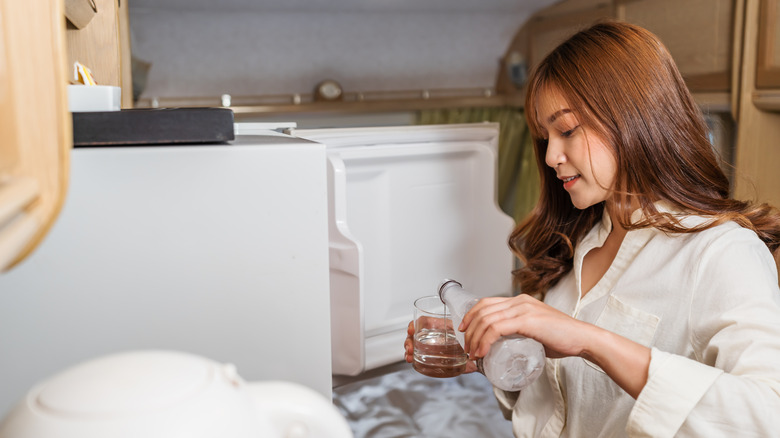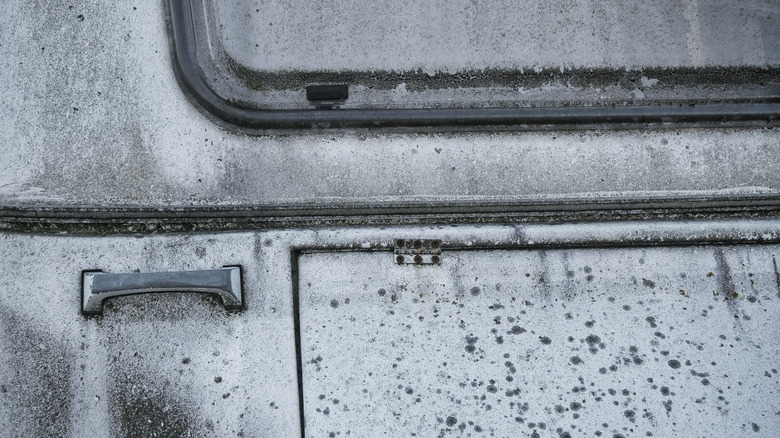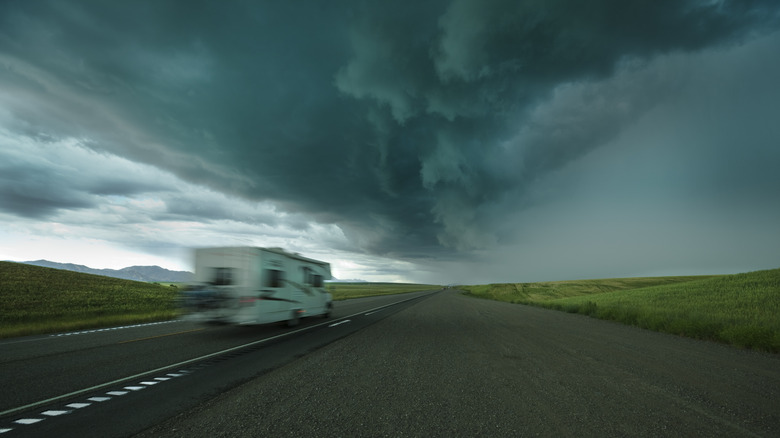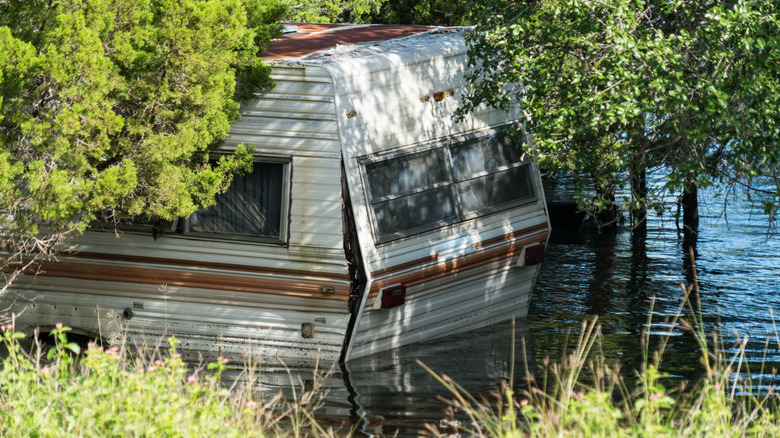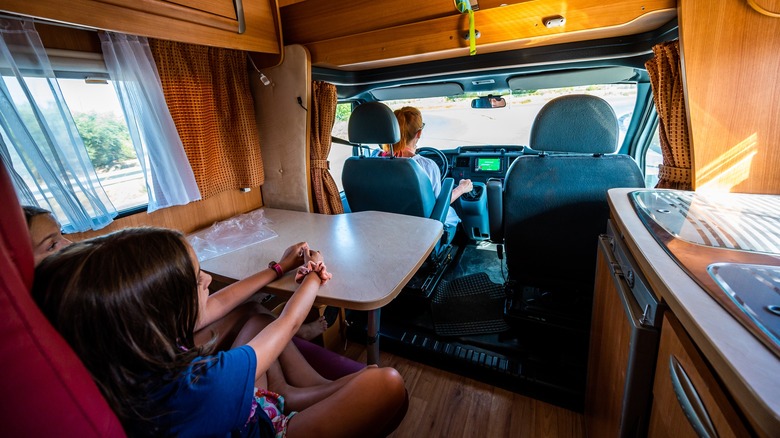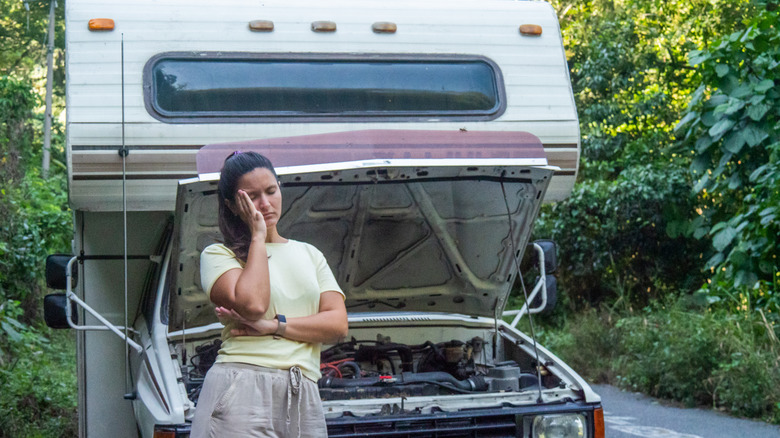Don't Ignore These Sneaky Dangers Of RV Living
If you've ever found yourself blowing off your work day to scroll through Instagram pics of life on the open road or imagined what it would be like to trade in the trappings of city life for the dreamy world of RV living, you're not alone. According to Go RVing, more folks are taking this deal all the time. In the site's comprehensive demographic profile of RV owners, Go RVing found that a whopping 11.2 million households now own RVs, with owners between the ages of 18 and 34 making up 22% of those owners. In fact, RV ownership as a whole has increased more than 62% over the past two decades.
Whether your RV dreams involve becoming a digital nomad and taking to the road full-time or you envision yourself trekking around the country for a few months out of the year, it's easy to get caught up in the fantasy of motorhome life and overlook some of the risks. But like anything else in life, it's important to completely understand what you're getting into and take the right precautions so you can safely focus on the important things like adventure and relaxation. To help you get started, here are some oft-overlooked dangers of RV living to consider before taking off on the adventure of a lifetime.
RV life could possibly affect your mental health
After decades of life enmeshed with social media, most of us are at least peripherally aware that we only see the good parts online. But it's still easy to get sucked into the magic and beauty of travel without really holding space for the negative feelings that you're bound to experience from time to time when you're traveling for weeks or months on end. When you're a full-time RVer, you truly need to be extra sensitive when it comes to planning for and tending to your mental health.
Part of this stems from the overall lack of privacy that comes with RV life. After all, an RV is a tiny house, no matter how you slice it. It's something RV travel writer Laura Jean wrote about in her blog Cool Mom and Collected, observing, "We were blessed with the RV community we had during our stationary years, but there was simply not enough space and privacy to feel at peace." And as Redditor u/learntorv wrote in r/RVLiving, "Emotions feel bigger in a tiny house. Not every day is that beautiful vista- life happens and suck happens." You're also away from your support network and loved ones for long periods and it can be hard to keep a steady schedule and structure to your days. A virtual therapist, regular exercise, scheduled check-ins with loved ones back home, and long-term RV parks are all good ways to help combat the nomad life blues.
General health care could potentially suffer, too
Getting sick is the pits no matter where you're at. But it's a whole lot easier to call up your doctor and get a script for an antibiotic when you're hanging out on your home turf than from a remote RV site thousands of miles from home. And since most health insurance plans are built around local networks, you may have a hard time finding a doctor your provider will pay for. To boot, if you have an ongoing health condition that requires regular prescriptions, setting this up can be especially difficult.
And the ugly truth is that it's also much easier to neglect your health overall when scheduling a regular check-in for a well visit or dental cleaning requires you to travel. As r/RVLiving user u/gaminegrumble observed, "Many parts of life are designed for stationary people. Car registration; health services; prescription pickup; veterinary care; ordering things online — these all are designed for stationary people and are annoying to deal with on the road."
That doesn't mean some RV Lifers can't make it work. Sites like RVer Insurance Exchange are all about helping full-time RV nomads find insurance policies that work for their lifestyle. And with the rise in telehealth services like Teledoc, staying on top of your health care on the road is easier today than it's ever been. Just remember to pair your telehealth services with a commitment to healthy lifestyle habits no matter where you roam.
Fire safety is just as important in your camper as at home
When was the last time you checked the batteries in your smoke detector? According to the U.S. Fire Administration, it's something we should all be doing monthly — even if most of us don't. In 2021, the National Fire Protection Association (NFPA) reported that for every five home fire deaths, nearly three could be traced to either failed smoke detectors or an absence of one. For homes with working smoke detectors, the risk of fire death goes down by 55% when compared to homes without them. The NFPA also found that fire — not floods, theft, or highway accidents — is the number one cause of RV loss, taking out as many as 2,000 motorhomes each year. Major causes of RV fires include overloaded circuits, cooking-related fires, and mechanical issues.
Like anything else, it's important to be cautious but not afraid, understanding that taking the appropriate precautions could mean the difference between a rough morning and a tragedy. Just as you would back at home, schedule smoke detector checks each month and change your batteries at least every six months. The NFPA also recommends being careful not to overload circuits, leave food unattended, or clutter up your space with electrical cords. You'll also want to keep a fire extinguisher in the front and back of your RV and make sure everyone in your rig knows how to use it correctly.
Water safety is a constant concern
Water is easy to take for granted when you're at home, but it can become something of a challenge when you're on the road. As you're traveling around the country, it's a mistake to blindly trust the water everywhere you stop. Generally speaking, potable and non-potable water will be labeled accordingly at RV parks. But as Boondocker's Bible warned, things can get a little dodgy as you start to get further off the beaten path.
And even when you're pretty sure you're drinking potable water, there's not always a guarantee. The peer-reviewed journal Case Reports in Infectious Diseases identified a case of pneumonia that could be traced back to Legionella in an RVer's water reservoir tank. The authors concluded that to prevent possible water-borne infections, "RV owners should implement regular chlorine disinfection of their water tanks and follow the recommended maintenance guidelines according to their owner's manuals." When in doubt, Boondocker's Bible recommends smelling the water in question to see if it has any odor and then taking a closer look to see if it's cloudy or appears yellow or greenish in the sunlight. Using bottled water for drinking or purifying your drinking water with water tablets are two more good approaches to ensure safe drinking water on the road.
Ignoring mold can lead to serious problems
Chances are good that you've heard at least one horror story about the dangers mold can impose on human health. Exactly how bad things can get was the subject of the 2002 "Forensic Files" episode "Breaking the Mold," which chronicled the frightening experience of Melinda Ballard and her family as mold in their Texas mansion threatened to destroy their health. And just as mold can creep into your home when it's stationary, imagine how susceptible your RV can be as it moves around the country where it's exposed to various mycotoxins. That's to say nothing of the rain and humidity that creates a welcoming environment for mold to take up residence in your RV walls. And once that mold gets in, it can be next to impossible to remediate.
Reddit is full of tales from RVers dealing with this unhealthy nuisance. After taking a 10-day break from their camper, one Redditor u/LocalPassenger1706 wrote, "I left the vent and a fan on in the camper for airflow and visited multiple times.... until the most recent time I went in, it's suddenly a MOLDSPLOSION." For safety reasons, it's probably best to call in a professional cleaning crew that's experienced with mold remediation in such cases. But what about preventing it to begin with? According to Emily Lawrence of RV Life, you should start by taking steps to reduce the humidity and moisture in your rig. It's also important to keep up with maintenance and regular cleaning.
Not planning ahead can lead to not having enough food
RV living offers an opportunity to sample local fare all over the country. But there is a downside to having to pick up your food in unfamiliar places. When you're living your day-to-day life in a city and suddenly realize there's not much left in the fridge, it's usually not the end of the world. Even if there's no grocery store near your home, you probably know where to go and can get there within a relatively short time frame. But this isn't always the case when you're traveling in an RV.
When you're in a different location from one day to the next, you'll have to spend time finding a grocery store every place you go. As RVer Mandy Wallace wrote in RV Miles, "Sometimes we shop for the week in a glorified gas station where a dozen eggs are $4 – and I'm not talking about the organic, free-range kind. It seems like in those stores, everything costs a dollar extra." If you find a good deal on groceries, you can't necessarily stock up given the limited amount of storage space available in your RV cabinets or fridge. This can also mean you end up having to eat out more than you'd like. As Redditor u/U_Nomad_Bro emphasized, shopping for limited space can be harder than it sounds: "Have I ever hung my head in shame as I returned some of the items I just bought to the grocery store? Yes. Yes, I have."
Driving in bad weather can be frightening
When you're imagining your life on the road, it's easy to imagine that life full of bluebird mornings and bright, sunny skies. But every hour you spend behind the wheel increases the chance that you'll encounter some sort of inclement weather. And the reality is that eventually, you might have to face something that leaves you feeling a little unsettled. What might seem like a little rough weather behind the wheel of a sedan can feel much more intense in a 30-foot camper. Even if you plan to pull over when things get hairy, doing so isn't always feasible. High winds can be particularly dangerous when you're driving an RV. Not only are they about as aerodynamic as billboards, but most motorhomes are rear-wheel drive, making them especially prone to slipping and sliding in wet or snowy weather.
And checking the weather before you go won't always keep you out of trouble. RVer and YouTuber Liz Amazing recounted one such frightening experience, saying, "The weather was fine at the campground that I was leaving and it was fine at my destination campground." But somewhere between those two points, a sudden storm rolled in that was so severe that she found herself having to pull over when the high winds unrolled her awning while she drove down the road. For best results, she recommends using a weather app designed to give you weather reports that coincide with your travel path.
You might accidentally park in a flood zone
One of the cool things about rolling around in your house is that technically, you could park just about anywhere — notwithstanding pesky details like parking regulations and private property ownership. But anytime you're traveling in unfamiliar territory, you can't necessarily take it for granted that the place you're parking is safe from flash floods. And this is actually a much bigger issue than most people might realize — something you can quickly get a primer on by searching YouTube for "RV and flash flood." Not only could a flash flood cost you your rig, putting you out of your home, but it could potentially become a threat to your life if you have the misfortune to get pulled into a fast-moving body of water.
The good news is that if you understand the risk, you stand a much greater chance of avoiding it — and this is especially true for RV flood avoidance. To stay safe, be sure to stay on top of the weather whether you're on the highway or parked. If the area you're staying in is under a flash flood warning, be ready to leave quickly and head to higher ground as there's no guarantee that the RV park you're camping in is not in a flood plain. If you can't move your rig, be ready to bug out without it. No amount of property is worth your life.
It's easy to overlook seat belt safety
For most of us, seatbelt safety is a given when we're rolling around town running errands or taking a short road trip in the family car. But when you're riding around with a literal house behind you, it's all too easy to get lackadaisical about buckling up. Maybe you're making a quick pop to the fridge for a Diet Coke and some leftover chicken nuggets or running to the loo for an in-transit pit stop. Either way, you wouldn't be the first RVer to live on the edge for a bathroom break or a snack. In fact, it's not necessarily against the law depending on where you're traveling. While states like California and Kentucky require seat belts for everyone inside the RV without exception, some states only require them for the folks up front, while others require them for children under a certain age.
And no matter what the law is where you happen to be at the time, RV crashes can be downright ugly. As a user in one Good Sam forum put it, "I have seen pictures of RVs turned into a pile of splinters." While many users agreed it's best to invest in a motorhome with a proven track record for crash safety, it's never a good idea to slack off when it comes to seat belts even in an RV. No matter how tasty those chicken nuggets are, just pull over before you grab them.
Overlooked maintenance is also a safety issue
It's easy to get away with putting off maintenance around your house. A slightly leaky roof or a loose floorboard could end up costing you down the road, but it's probably not the end of the world if you put it off for a while. But in an RV, basic maintenance is your lifeline — particularly if you're living your life on the road and putting constant miles on your rig. Failure to maintain your drivetrain or tires could leave you stranded in the middle of nowhere. Even a small roof leak — something that's common in RVs — can become a very serious issue if not addressed right away.
And then there's the potentially deadly issue of propane leaks. According to an incident investigation in Technical Safety BC, one RV explosion was traced back to a propane cylinder malfunction that was most likely due to corrosion within the oven tubing. When the owner of the motorhome went to light the stove, the propane leak ignited, causing an explosion that led to severe burns across the individual's ears, face, hands, and legs. To keep everyone in your camper safe, be sure to inspect your RV regularly and install a propane leak detector.
